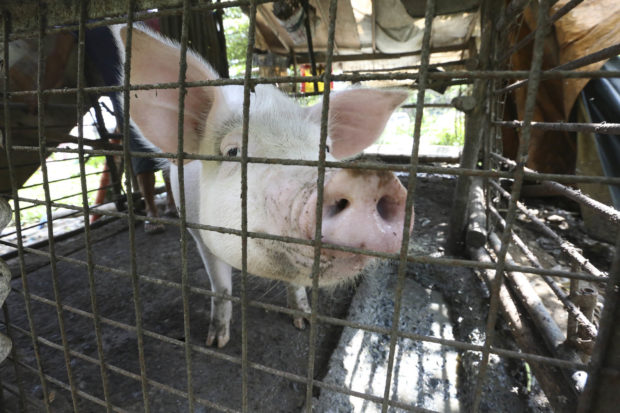LAOAG CITY—Hog raisers in Solsona town in Ilocos Norte province have accounted for at least P7.7 million in losses due to the African swine fever (ASF), according to local officials.
The viral disease, which was first traced to hogs raised in Barangay Manalpac on June 4, has since spread to three more villages in Solsona, and in the neighboring town of Dingras, said Dr. Loida Valenzuela, provincial veterinarian, in a press briefing on June 30.
The disease had wiped out at least 1,543 hogs raised by 229 backyard and commercial raisers in the town in the past three weeks, local data showed.
In Dingras alone, around 488 hogs from the village of San Marcelino had been culled to prevent the spread of ASF.
Alfonso Jeziel de los Reyes, Solsona information officer, told the Inquirer on July 2 that a local raiser was found to have inadvertently dumped his dead hogs at an irrigation site in Maananteng village, which could have contaminated the waters flowing to the other villages.
‘Risky investment’
Authorities appealed to raisers to refrain from feeding their hogs with “swill” or leftover food and avoid getting their water supply from the town’s irrigation canal system.“Investing in the [hog] industry during these times entails a lot of risks,” Benjamin Viloria, a hog raiser from Solsona, told the Inquirer in a separate interview on July 2. Viloria lost at least P460,000 after 92 of his hogs had been culled.
He added: “Despite this unfortunate event, there is nothing I could really do than to abide by the measures put in place by the government to prevent the further spread of the disease.”
Authorities in Solsona and Dingras towns have intensified their monitoring activities by reinforcing border checkpoints to regulate the movement of live hogs and pork products.
A crackdown was also ordered by local officials on the illegal hunting and trading of “alingo” (wild boar), which was seen by agriculture authorities to have introduced the disease in the town’s pig stock.
Affected hog raisers were earlier given financial and livelihood assistance, while other hog raisers in other towns and cities in the province which are not yet affected by the disease were also asked to insure their pigs with the Philippine Crop Insurance Corp.
Ilocos Norte’s hog industry is worth around P4.98 billion, according to the latest data from the Philippine Statistics Authority.
